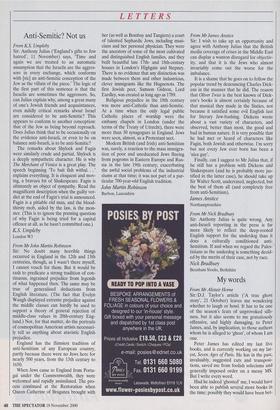LETTERS Anti-Semitic? Not us
From K S. Umpleby Sir: Anthony Julius (England's gifts to Jew hatred', 11 November) says, `Time and again we are treated to an automatic assumption that the Israelis are the aggres- sors in every exchange, which conforms with [sic] an anti-Semitic conception of the Jew as the villain of the piece.' The logic of the first part of this sentence is that the Israelis are sometimes the aggressors. So, can Julius explain why, among a great many of one's Jewish friends and acquaintances, even mildly critical remarks about Israel are considered to be anti-Semitic? This appears to conform to another conception: that of the Jew as being beyond reproach. Does Julius think that to be occasionally on the evidence anti-Israeli, or even to be on balance anti-Israeli, is to be anti-Semitic?
The remarks about Shylock and Fagin were similarly crude and partial. Shylock is a deeply sympathetic character. He is why The Merchant of Venice is a great play. The speech beginning 'To bait fish withal. .. ' explains everything. It is eloquent and mov- ing, a bravura bit of Shakespeare. Fagin is ultimately an object of sympathy. Read the magnificent description when the guilty ver- dict at the end of Fagin's trial is announced. Fagin is a pitiable old man, and the blood- thirsty mob, aided by the law, is the mon- ster. (This is to ignore the pressing question of why Fagin is being tried for a capital offence at all, as he hasn't committed one.) KS. Umpleby
London W3


































































































 Previous page
Previous page